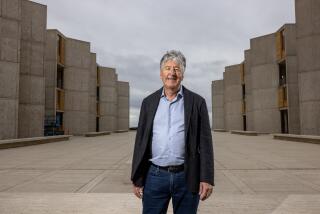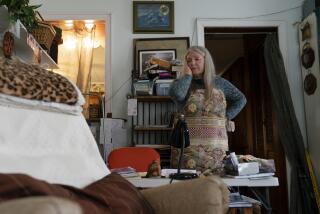San Diego Team Gets $6.5 Million for AIDS Study
- Share via
A San Diego-led research group has been awarded a $6.5-million, five-year federal grant to search for an AIDS vaccine, bringing to two the number of vaccine projects being spearheaded by scientists in the area.
Flossie Wong-Staal, a leading AIDS researcher who came to UC San Diego this year from the National Cancer Institute, put together a consortium of five groups that will test three different vaccine approaches. They will:
* Assemble distinctive pieces of the AIDS virus’ outer coat into an octopus-like protein molecule, to see if it stimulates an immune response that could block infection by the full AIDS virus.
* Produce AIDS virus particles lacking the genetic coding necessary to infect people, to see if the particles might be used to immunize mammals against acquired immune deficiency syndrome.
* Use viruses responsible for the common cold--rhinoviruses--to deliver pieces of the AIDS virus into organisms. Rhinoviruses are highly effective in infecting cells in mammals.
The grant is part of a larger program by the National Institute of Allergy and Infectious Diseases, said Dr. Wayne C. Koff, chief of the vaccine research and development branch at the institute. About a dozen groups in the country have been funded, he said.
“The type of program that (Wong-Staal) has put into place has filled an important niche in our efforts, because it encompasses a variety of approaches that there’s not currently an extensive amount of work being done on,” Koff said.
The work with rhinoviruses as an immunization tool is of particular interest, Koff said. So, too, will be the results of vaccine tests on a special kind of mouse developed at La Jolla’s Medical Biology Institute, he said.
The mice have no immune system of their own, but have a human immune system transplanted into them. Earlier this year, scientists at the La Jolla firm reported promising results in vaccine tests done with a Bristol-Myers Squibb Corp. product.
As one of the collaborators in the federal grant, Medical Biology Institute will for the first time be receiving government recognition of its mouse experiments, said Dr. Donald Mosier, scientific director.
The other three collaborating scientific groups are one from Rutgers University in New Jersey, one from the University of Washington Primate Center, and a New York firm, United Biomedical Inc., Wong-Staal said.
Wong-Staal spent 16 years at the National Cancer Institute. She became widely regarded as a leading AIDS researcher in recent years because of her groundbreaking work on the molecular structure of human immunodeficiency virus, HIV, which causes AIDS.
Her work is cited so often by other researchers in their scientific papers that she was singled out recently by a scientific newspaper, The Scientist, as one of nine “superstars of science.”
On Jan. 1, she became the first person appointed to the Florence Seeley Riford Chair for AIDS Research at UCSD.
The other major vaccine effort led by a San Diego researcher is that of Dr. Jonas Salk, whose potential vaccine is being tested on human volunteers at USC.
Recently Salk told a meeting at George Washington University in Washington that he has abandoned his idea as an AIDS vaccine, and instead regards it as an inoculant that might eliminate symptoms or prolong the lives of people already infected with HIV, according to a report in Newsday.






